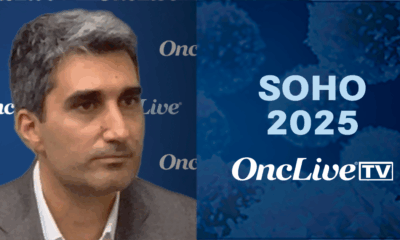Science
New CRISPR Tool Enhances Cancer-Killing Power of NK Cells

A groundbreaking study from The University of Texas MD Anderson Cancer Center reveals that novel gene editing techniques significantly enhance the cancer-fighting capabilities of natural killer (NK) cells. Researchers utilized an innovative CRISPR screening tool called PreCiSE to identify key gene targets, leading to improved anti-tumor activity against various cancer types. The findings were published in the journal Cancer Cell on October 19, 2023.
The research, led by Katy Rezvani, MD, PhD, a professor of Stem Cell Transplantation and Cellular Therapy, demonstrates that by removing specific gene targets, NK cells can become markedly more effective at destroying cancer cells. “Targeted gene editing is a powerful tool to enhance the anticancer activity of NK cells,” said Rezvani, who is also vice president and head of the Institute for Cell Therapy Discovery & Innovation. She emphasized that PreCiSE offers a comprehensive framework for understanding how tumors suppress NK cell function and how to manipulate these cells to overcome such challenges.
Through the PreCiSE platform, the research team identified multiple checkpoints and pathways that regulate NK cell activity, particularly in the challenging environment of tumors. This tumor microenvironment is often filled with factors that inhibit immune responses. By editing out these suppressive targets, researchers were able to bolster both innate and chimeric antigen receptor (CAR)-mediated NK cell functions. The study showed that such modifications improved metabolic fitness, increased the production of pro-inflammatory cytokines, and expanded cytotoxic NK subsets in cancer models resistant to existing treatments.
The study highlights three validated targets: MED12, ARIH2, and CCNC. While these targets are significant, the broader implications of the research extend beyond individual genes. PreCiSE offers an unbiased roadmap to identify and prioritize NK cell regulators, enabling the design of more effective CAR NK cell therapies.
In validating their findings, researchers conducted in vivo experiments using several tumor models under conditions with defined immune-suppressive stressors. Notably, some regulators, like MED12 and CCNC, intersect with pathways known in T cell biology, while others, such as ARIH2, appear to be specific to NK cells. This distinction underscores the value of a platform tailored specifically for NK cell research.
“This has given us significant insight into the next generation of cell therapies that have the potential to be more powerful, precise, and resistant to cancer,” Rezvani stated. Her laboratory has been at the forefront of engineered NK cell therapy and is currently advancing CAR NK approaches in clinical trials for patients with advanced hematologic and solid malignancies.
The findings from this study are expected to play a crucial role in further enhancing the efficacy of CAR NK cells across a wider range of cancer types. The research was supported by various philanthropic contributions to the Institute for Cell Therapy Discovery & Innovation, highlighting the collaborative effort behind this important work.
As the scientific community continues to explore the potential of CAR NK cells, the insights gained from this research may lead to more robust and effective treatments for patients facing difficult cancer diagnoses. A full list of collaborating authors and their disclosures can be found in the published paper.
-

 Technology5 months ago
Technology5 months agoDiscover the Top 10 Calorie Counting Apps of 2025
-

 Health3 months ago
Health3 months agoBella Hadid Shares Health Update After Treatment for Lyme Disease
-

 Health3 months ago
Health3 months agoErin Bates Shares Recovery Update Following Sepsis Complications
-

 Technology4 months ago
Technology4 months agoDiscover How to Reverse Image Search Using ChatGPT Effortlessly
-

 Technology1 month ago
Technology1 month agoDiscover 2025’s Top GPUs for Exceptional 4K Gaming Performance
-

 Technology2 months ago
Technology2 months agoElectric Moto Influencer Surronster Arrested in Tijuana
-

 Technology5 months ago
Technology5 months agoMeta Initiates $60B AI Data Center Expansion, Starting in Ohio
-

 Technology5 months ago
Technology5 months agoRecovering a Suspended TikTok Account: A Step-by-Step Guide
-

 Health4 months ago
Health4 months agoTested: Rab Firewall Mountain Jacket Survives Harsh Conditions
-

 Lifestyle5 months ago
Lifestyle5 months agoBelton Family Reunites After Daughter Survives Hill Country Floods
-

 Technology4 months ago
Technology4 months agoHarmonic Launches AI Chatbot App to Transform Mathematical Reasoning
-

 Technology3 months ago
Technology3 months agoUncovering the Top Five Most Challenging Motorcycles to Ride















